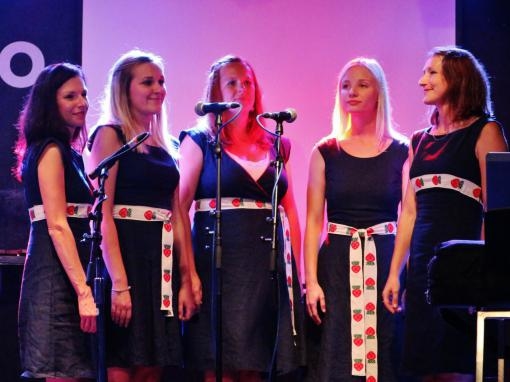In the somewhat untraditional environment of Brno’s Metro Music Bar there was a performance by the musical ensemble with the name Musica Folklorica, a group that needs little introduction for folk fans. These excellent musicians perform mainly their own arrangements of folk songs especially from Horňácko, Myjava and also Romania. They came to Brno to christen what is now their eleventh album.
The mentioned CD with the title Smrti, milá smrti (Death, Sweet Death) is part of the Anthology of Moravian Folk Music, which has been brought out by the publisher Indies Scope already from 2011. It is a representative sample of the contemporary form of folk music divided by region and theme into individual albums. Eight have been issued so far. Among them are for example Milostné a svatební písně (Love and Wedding Songs), Čas adventu a Vánoc (The Period of Advent and Christmas), Verbuňky a písně rekrutské (Verbuňk and Recruiting Songs) as well as discs presenting individual regions of Moravia such as Valašsko, Lašsko and Horňácko.
The first half of the concert was dedicated to older songs from the group’s repertoire. Before the intermission there was the christening itself. Godfather to the album was Milan Páleš, representing his publishing company Indies Scope. The second part of the programme was for the most part dedicated to new pieces. At the end of the concert the musicians also performed several pieces of instrumental folk music from Romania, which has long been a favourite part of their repertoire with audiences. As is already a tradition the group works with many gust singers. Those coming to Brno were Martin Prachař, Sára Slováková, Anna Urbaničová, the Horňácko women’s choir Oskoruša and the living legend of Horňácko folk – Master Martin Hrbáč.
Viewers who like stylised and carefully arranged folk music material certainly got what they wanted. Musica Folklorica, with their leader Miroslav Kolacia, are masters of this craft. However in several parts the musicians showed that they have no difficulty with the traditional form of playing. The members of the group are excellent musicians who have already played in many other ensembles. The violinist Lubomír Graffe was for example for many years the leader of VUS Ondráš. In Metro as might have been expected there was a professional performance. The concert perhaps lacked greater spontaneity, or rather liveliness, which is part of the folk tradition, but in the encores that the audience demanded they showed that they are also capable of this.
While at the concert they were slightly paradoxically christening songs of death, the evening was not at all gloomy. Rather the opposite with the sold-out hall supporting musicians more than once with a storm of applause. And that says everything.
































No comment added yet..